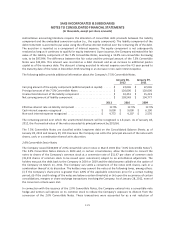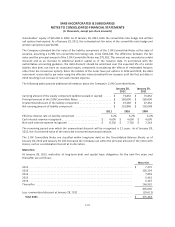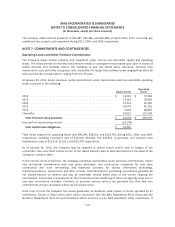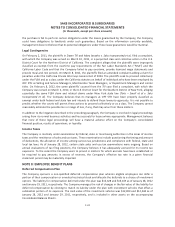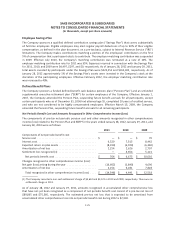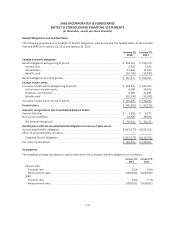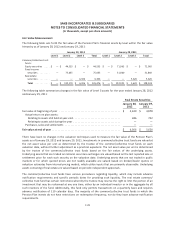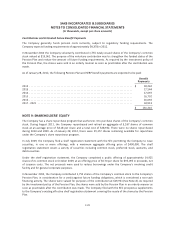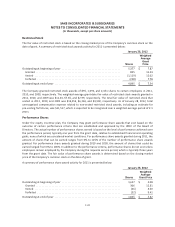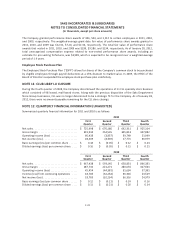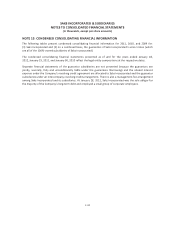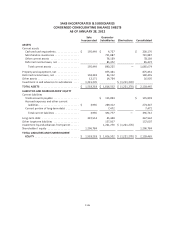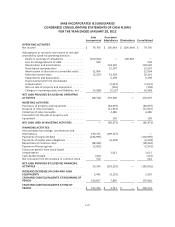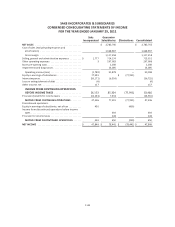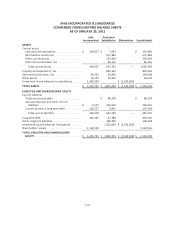Saks Fifth Avenue 2011 Annual Report Download - page 75
Download and view the complete annual report
Please find page 75 of the 2011 Saks Fifth Avenue annual report below. You can navigate through the pages in the report by either clicking on the pages listed below, or by using the keyword search tool below to find specific information within the annual report.
SAKS INCORPORATED & SUBSIDIARIES
NOTES TO CONSOLIDATED FINANCIAL STATEMENTS
(In thousands, except per share amounts)
NOTE 10: STOCK-BASED COMPENSATION
The Company maintains an equity incentive plan, which allows for the granting of stock options, stock
appreciation rights, restricted stock, performance share awards and other forms of equity awards to
employees, directors, and officers. As of January 28, 2012, there were 2,675 shares available for future grants
under the equity incentive plan. Stock options granted generally vest over a four-year period from the grant
date and have a contractual term of seven to ten years from the grant date. Restricted stock and performance
share awards generally vest over periods ranging from three to five years from the grant date, although the
equity incentive plan permits accelerated vesting in certain circumstances at the discretion of the HRCC of the
Board of Directors. The Company does not use cash to settle any of its stock-based awards and issues new
shares of common stock upon the exercise of stock options and the granting of restricted stock and
performance shares.
Total stock-based compensation expense and related tax benefits recognized in fiscal years 2011, 2010, and
2009 are as follows:
2011 2010 2009
Stock options ............................................. $ 1,293 $ 2,016 $ 2,197
Restricted stock ........................................... 10,922 11,510 10,974
Performance share awards .................................. 3,382 3,240 3,675
Total stock-based compensation ........................... $ 15,597 $ 16,766 $ 16,846
Total income tax benefit recognized related to stock-based
compensation expense ................................... $ 6,089 $ 6,871 $ 6,570
Stock Options
The fair value of stock options is determined on the grant date utilizing the Black-Scholes valuation model. The
Black-Scholes model estimates the expected value employees will receive from the stock options based on a
number of assumptions, such as interest rates, employee exercises, the Company’s stock price and dividend
yield. The weighted-average Black-Scholes fair value assumptions utilized in determining grant-date fair values
are as follows:
2011 2010 2009
Expected term ........................................................ n/a n/a 4.75 years
Risk-free interest rate .................................................. n/a n/a 2.1%
Expected volatility .................................................... n/a n/a 57.0%
Expected dividend yield ................................................ n/a n/a 0.0%
The expected term is the period over which employee groups are expected to hold the stock options until they
are exercised and it determines the period for which the risk-free interest rate, volatility, and dividend yield
must be applied. The expected term is calculated using the simplified method. The risk-free interest rate is
based on the U.S. Treasury rate securities that mature over the expected term of the stock option. Volatility
reflects movements in the Company’s stock price over the most recent historical period equivalent to the
expected term. The dividend yield is zero as the Company does not anticipate declaring dividends in the near
term.
F-30



